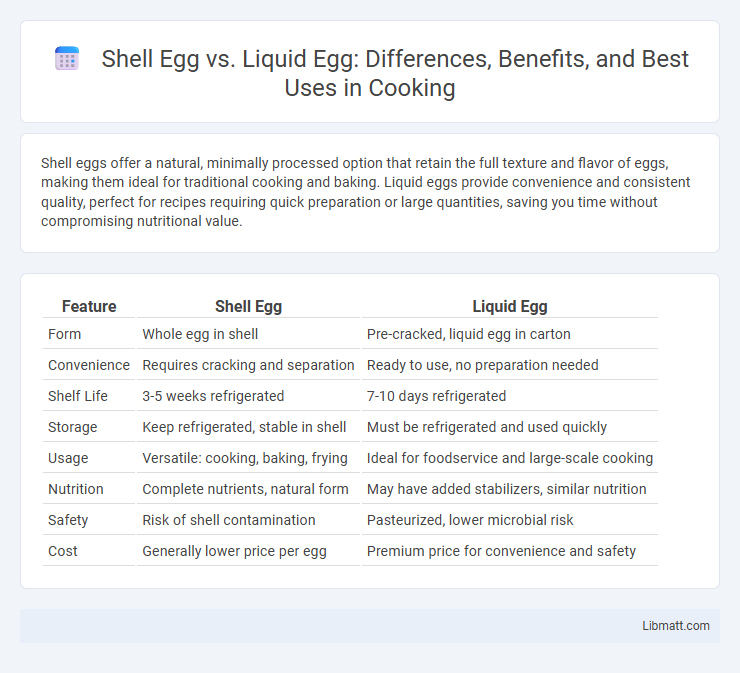Shell eggs offer a natural, minimally processed option that retain the full texture and flavor of eggs, making them ideal for traditional cooking and baking. Liquid eggs provide convenience and consistent quality, perfect for recipes requiring quick preparation or large quantities, saving you time without compromising nutritional value.
Table of Comparison
| Feature | Shell Egg | Liquid Egg |
|---|---|---|
| Form | Whole egg in shell | Pre-cracked, liquid egg in carton |
| Convenience | Requires cracking and separation | Ready to use, no preparation needed |
| Shelf Life | 3-5 weeks refrigerated | 7-10 days refrigerated |
| Storage | Keep refrigerated, stable in shell | Must be refrigerated and used quickly |
| Usage | Versatile: cooking, baking, frying | Ideal for foodservice and large-scale cooking |
| Nutrition | Complete nutrients, natural form | May have added stabilizers, similar nutrition |
| Safety | Risk of shell contamination | Pasteurized, lower microbial risk |
| Cost | Generally lower price per egg | Premium price for convenience and safety |
Introduction to Shell Eggs and Liquid Eggs
Shell eggs come in their natural form, encased in a protective calcium shell, offering freshness and versatility for cooking and baking. Liquid eggs are processed eggs removed from their shells, pasteurized for safety, and packaged in convenient containers for quick use in recipes or foodservice. Your choice between shell eggs and liquid eggs depends on convenience, shelf life, and specific culinary needs.
What Are Shell Eggs?
Shell eggs are whole eggs sold in their natural, unprocessed form with the protective shell intact, typically harvested from hens and packaged for retail. These eggs retain all components, including yolk and albumen, ensuring freshness and versatility for various cooking methods such as boiling, frying, or baking. Shell eggs offer consumers a longer shelf life when stored properly and are often preferred for their natural state and culinary adaptability.
What Are Liquid Eggs?
Liquid eggs are pasteurized egg products made by cracking, blending, and filtering whole eggs, egg whites, or egg yolks into a convenient, ready-to-use form. They are designed to reduce the risk of salmonella contamination and extend shelf life, making them ideal for foodservice operations and home cooks seeking efficiency. Your choice between shell eggs and liquid eggs depends on preferences for freshness, convenience, and safety in meal preparation.
Nutritional Comparison: Shell Egg vs Liquid Egg
Shell eggs typically contain higher levels of essential nutrients such as vitamin D, choline, and lutein compared to liquid eggs, which often undergo processing that may reduce nutrient density. Liquid eggs provide convenience and consistent quality but can have increased sodium content and slightly lower levels of fat-soluble vitamins due to pasteurization. Both forms offer high-quality protein, but shell eggs maintain a more complete nutrient profile beneficial for balanced dietary intake.
Taste and Texture Differences
Shell eggs offer a richer, creamier taste with a firmer texture due to their natural composition, making them ideal for dishes requiring distinct egg structure. Liquid eggs, often pasteurized and homogenized, provide a more consistent but milder flavor and softer, uniform texture, preferred in bulk food preparation and convenience cooking. Taste and texture differences stem from the processing methods and freshness, influencing culinary applications and consumer preferences.
Safety and Handling Considerations
Shell eggs require careful handling to prevent contamination from bacteria like Salmonella on the outer shell, emphasizing the importance of washing hands and surfaces after contact. Liquid eggs undergo pasteurization processes that significantly reduce pathogens, offering a safer option for raw or lightly cooked recipes. Proper refrigeration is crucial for both forms to inhibit bacterial growth and maintain freshness, with liquid eggs typically needing stricter temperature control due to their processing and packaging.
Convenience and Storage
Shell eggs offer the convenience of easy portion control and a longer shelf life when stored properly in the refrigerator at around 40degF (4degC). Liquid eggs provide time-saving benefits by eliminating cracking and separating steps, stored in sealed containers with a shelf life of approximately 7 to 10 days under refrigeration. Both options require refrigeration, but liquid eggs require less prep time, making them ideal for commercial kitchens and busy households seeking efficient meal preparation.
Culinary Uses and Applications
Shell eggs provide versatility in culinary applications such as baking, frying, and boiling, allowing for precise control over texture and presentation. Liquid eggs offer convenience and consistency, ideal for large-scale food production, omelets, and scrambling without the need for shell handling. Your choice between shell and liquid eggs depends on the balance between freshness, ease of use, and specific recipe requirements.
Cost and Availability
Shell eggs are typically more cost-effective and widely available in grocery stores compared to liquid eggs, which often come at a premium due to processing and packaging. Liquid eggs offer consistent quality and convenience but may be harder to find in smaller retailers or regions with limited distribution. Your choice depends on budget constraints and whether ease of use or cost is the priority in your kitchen.
Which Is Better: Shell Egg or Liquid Egg?
Shell eggs offer superior freshness and better flavor retention compared to liquid eggs, making them ideal for recipes where taste and texture are critical. Liquid eggs provide convenience, longer shelf life, and consistent quality, which can save time in meal preparation and reduce waste. Your choice depends on whether you prioritize natural taste and freshness or efficiency and ease of use in cooking.
Shell Egg vs Liquid Egg Infographic

 libmatt.com
libmatt.com